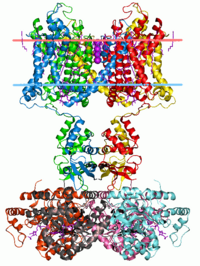
Photo from wikipedia
High-voltage potassium-based batteries are promising alternatives for lithium-ion batteries as next-generation energy storage devices. The stability and reversibility of such systems depend largely on the properties of the corresponding electrolytes.… Click to show full abstract
High-voltage potassium-based batteries are promising alternatives for lithium-ion batteries as next-generation energy storage devices. The stability and reversibility of such systems depend largely on the properties of the corresponding electrolytes. This review first presents major challenges for high-voltage electrolytes, such as electrolyte decomposition, parasitic side reactions, and current collector corrosion. Then, the state-of-the-art modification strategies for traditional ester and ether-based organic electrolytes are scrutinized and discussed, including high concentration, localized high concentration/weakly solvating strategy, multi-ion strategy, and addition of high-voltage additives. Besides, research advances of other promising electrolyte systems, such as potassium-based ionic liquids and solid-state-electrolytes are also summarized. Finally, prospective future research directions are proposed to further enhance the oxidative stability and non-corrosiveness of electrolytes for high-voltage potassium batteries.
Journal Title: Molecules
Year Published: 2023
Link to full text (if available)
Share on Social Media: Sign Up to like & get
recommendations!